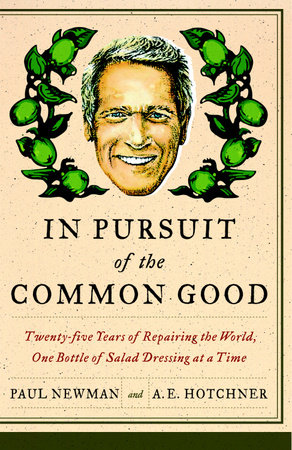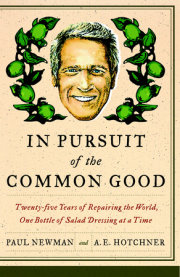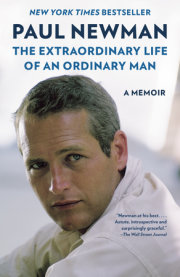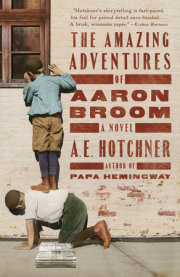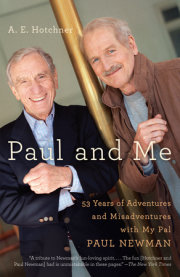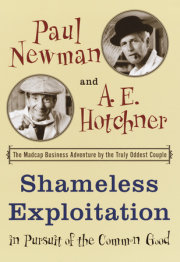Chapter 1
It is December 1980, a week before Christmas, Westport, Connecticut, a blanket of snow on the ground, wood smoke from fireplaces redolent in the air, tree lights festooning the houses, a pervasive Yuletide lilt, but we are laboring in the subterranean space beneath Paul's converted barn, an area that had once been a stable for farm horses. There is a bucket filled with ice-blanketed Budweisers and an array of bottles of olive oil, vinegar, mustard, condiments, and so forth. There is also an empty tub and a collection of old bottles dating back to Revolutionary times by their appearance, bottles of various shapes and sizes that had been somewhat sanitized for this occasion.
Paul Newman, known to his friends as ol' PL or Calezzo de Wesso (Bonehead), had asked his buddy A. E. Hotchner (Hotch), sometimes called Sawtooth, to help him with a Christmas project that he was assembling in this basement, which wasn't a basement in the usual sense. There were crusty stones, a dirt floor, crumbling cement, and overhead timbers covered with active cobwebs. Also three long since vacated horse stalls, but the unmistakable aroma of horses remained. There were desiccated manure fragments here and there, and there was evidence that certain field animals were still occupying the premises. A very picturesque place in which to mix salad dressing.
The project was to mix up a batch of PL's salad dressing in the washtub and fill all those old wine bottles using the assembled funnels and corks and labels, and on Christmas Eve our collective families would go around the neighborhood singing carols and distributing these gift bottles of PL's dressing.
PL was very proud of his salad dressing, and this was the apotheosis of his salad days. Over the years, even in four-star restaurants, PL had been rejecting the house dressings and concocting his own. Captains, maitre d's, and sometimes the restaurant owner would scurry around to assemble Paul's ingredients while neighboring diners gawked in disbelief. When we first ate at Elaine's, one of New York's popular restaurants, several waiters and Elaine herself gathered round as Paul blended and tasted the brew he made from the ingredients brought to him from the kitchen. This scene had been repeated in such varied eateries as a Greek diner, at a wedding party, in an outdoor restaurant, on the island of Eleuthera, and in snazzy restaurants from coast to coast. When his kids went off to school, Paul would fill a couple of bottles of dressing for them to take along. On one occasion, when the restaurant mistakenly served the salad with its own dressing, Paul took the salad to the men's room, washed off the dressing, dried it with paper towels, and, after returning to the table, anointed it with his own, which he concocted with ingredients brought to him from the kitchen.
At that time, almost all dressings, especially the mass-market ones, contained sugar, artificial coloring, chemical preservatives, gums, and God knows what. So Paul really started to make his own dressing not just as a taste preference, but also as a defense against those insufferable artificial additives.
That evening the basement operation seemed to go on forever. We had never tried to mix a vat of salad dressing, let alone pound a 1925 syrup cork into an 1895 vinegar bottle, especially after a few beers. Sometimes the mallet would smack the cork, and sometimes it nailed our thumbs. Paul carefully measured amounts of olive oil and vinegar, for he had no feel yet for dealing with a quantity like this, which, he decided, required six boxes of black pepper.
He was almost crazed as he stirred the dressing with the wooden paddle. There's a river that runs alongside his house, and the paddle most certainly came from his canoe. It was his notion that the olive oil and vinegar had a sort of hygienic effect so that one didn't have to wash anything thoroughly. That aside, he was highly critical of Hotch's paddle technique. The motion, he insisted, had to have an even, smooth rhythm that would not create frothing. But Hotch couldn't get the hang of it. "You've got to go with the paddle," Paul said. "Don't pull it straight toward you, waffle it, gyrate it, go with the paddle." Hotch said he was going with the paddle, but, having had four beers, if he went with the paddle too much, he was going to fall facedown in the tub. Paul said as long as it wasn't butt first, not to worry about it.
Occasionally, during the hours we labored, somebody would show up--Caroline, the housekeeper, or Joanne or one of Paul's kids. But they had the good sense to stop at the door. The smell of vintage horse piss and mold had now commingled with the aroma of Budweiser and the salad dressing ingredients, a combination that did not exactly beckon. So they stood near the door and announced that dinner was ready, or Aunt Margaret was here, or the police wanted to invalidate Paul's driver's license, but Paul said we still had work to do, whereupon everyone seemed to scatter in a hurry. No one dared venture into that place. It was forbidding, or sanctified, maybe.
The precise number of giveaway bottles were lined up on the dirt floor like a battalion of infantry soldiers, but there was still a quantity of dressing left in the tub. That's when it occurred to Paul that we could bottle the rest, hustle them into some upscale local food stores, make a buck, and go fishing. But Hotch, a refugee from law school, put on the brakes: "It's against the law," he shouted. "Look at this place! The bugs can't even stay alive here! If somebody croaks from ingesting this stuff, you'll be in court, with no liability insurance. You could wind up without your basement and everything above it. There are certain rules and regulations to be followed--hygienic, first and foremost, proper labeling, government stuff!"
With his barn at stake, Paul agreed that they'd have to take out insurance, create a proper label, and get a bona fide bottler and see if it would sell.
And that is how our baby got started--not in a manger, but in a tub--not a wise man in sight--a fading movie star and a cantankerous writer, but that was it.
Chapter 2
It is 1982, and we are sitting in the conference room of the largest marketing company in America. A long, burnished table is presided over by its president, with five of his department heads in attendance, all experts in how to market new products in the United States. Very imposing. On the table in front of us we have a bottle, once filled with Chianti, now containing an olive oil and vinegar salad dressing, which is the object of this meeting.
"You gentlemen have come to the right place," the president tells us. "We launch new products for some of the biggest brands in America--Libby's, Heinz, Del Monte, Campbell's, Kraft--so we can give you an exponential trajectory on the welter of details that have to be accomplished to launch your salad dressing.
"It's essential to know in advance how the public will react to your product. So we would dispatch people across the country to gather together focus groups of varied ethnicity, financial strata, age groups, sexual preference, fast-food habits, footwear use or nonuse, deodorants, the whole load. We would go around the country, asking folks in shopping malls and such places how they like the bottle, the name, the taste--we'd have them sample it on lettuce, tomatoes, onions, cabbage, sausage. Then the price--you have to set a price for us--questions like that, and then in maybe seven or eight sections of the country we'd correlate the results and study them to let you know how to adjust all those things to maximize your introductory impact."
"What would that cost?" we ask.
"Depending on the focus depth, somewhere between three hundred and four hundred thousand dollars. Now once you're ready to roll out the product, you'll have to learn how to attend to distribution, promotion and advertising, public relations--our experience is with the big guys--Heinz, Kraft, etc., and they figure to spend a million dollars to launch a new product--that's the general rule the first year. We'll teach you how to muscle into the big stores--you'll have to make deals, especially with outfits like A&P and Kroger's--discounts, two-for-ones, free stuff, just to get your bottle on the shelf--and then how to avoid winding up on the bottom shelf, down below the packed rows of Krafts and Wishbones, which have all the eye-level spaces. The odds on new products are about the same as roulette. Even the biggest companies have had expensive failures--Campbell's refrigerated soups, Gerber's 'adult' food line, Nabisco's giant-size Oreo cookies. And then there's the history of celebrity products--which Karen will tell you about."
"Celebrity products fall into a category of their own," said Karen, a trim blonde in a tailored suit. "That doesn't refer to fictional characters like Aunt Jemima, Betty Crocker, and Sara Lee. Nor does it mean endorsers, like the sport stars that appear on Wheaties boxes. But when celebrities come out with their own products--Rocky Graziano's spaghetti sauce, Mickey Mantle's barbecue sauce, Nolan Ryan's All-Star Fruit Snacks, Gloria Vanderbilt's salad dressing, Reggie Jackson's candy bar, Carl Yastrzemski's Big Yaz Bread, Diane von Furstenberg's facial tissue, Bill Blass's chocolates, Polly Bergen's Turtle Oil, Marilyn Monroe's Merlot, Fess Parker's wine, James Darren's spaghetti sauce, Phyllis Diller's Philli Dilli Chili, Richard Simmons's Salad Spray, Tommy Lasorda's spaghetti sauce, Yves St. Laurent's cigarettes, Frank Sinatra's neckties--all examples of products these famous people promoted with unsatisfactory results. Take Graziano, for example. He was a popular prizefighter, middleweight champ, big fights with Tony Zale, and as an entertainment personality he appeared in a series of television shows and all kinds of television sitcoms and whatnot. Rocky promoted the hell out of his sauce, but after an initial surge, it simply died and dropped off the shelves--shoppers bought one curiosity jar and that was it. There's never been a real celebrity success in the food business. We estimate the total start-up loss for celebrity products somewhere close to nine hundred million dollars.
"People are serious about their food dollars. They're not at the dinner table to be entertained, they're there to enjoy the food they're eating, which they've purchased within their budgets."
"Now don't be too discouraged by all of this," the president said as Hotch's face dropped in discouragement. "There's always a first time. But no one can predict public response--politics, automobiles, fashion, music, name it. It's a crapshoot, but if we canvass our focus groups and we adjust your product to respond to it, and if you have the capital to get through the losses of the first year, I'd say the odds would be fifty-five to forty-five against flopping."
"No offense, Mr. Newman," Karen said, "but just because they liked you as Butch Cassidy doesn't mean they'll like your salad dressing."
"Maybe we should call it Redford's Own."
"They wouldn't like it any better."
"I'd like to have someone to blame."
We thanked them for their time and said we'd think it over. We said nothing on the walk across the parking lot to Newman's Volkswagen, the rear seat of which had been removed to accommodate a small block Ford V-8.
After we got rolling, we discussed what we had just heard and decided that it would be better to devise a plan of our own: Gather a dozen or so friends and neighbors to a blind tasting that would pit our dressing against all the leading brands, thereby spending $40 rather than $400,000. Then Paul suggested that we each put up $20,000 for starters, causing Hotch to pitch forward and hit his head on the dashboard, the sum of $20,000 making him light-headed, claiming that $20,000 was beyond his grasp. But he admitted he had $12,000 in hand, which he claimed was racetrack winnings that he owed in back rent, despite the fact that he owned his house. So it was decided that we would split the "brainstorming" responsibilities. Hotch would do the legwork and Paul would put up the seed money.
By the time we were on the open road, traveling at Newman's usual 90 mph pace, we both felt pretty good about the afternoon, having saved $1,320,000.
Chapter 3
Actually, the Newman's Own moniker was originally intended not for a bottle of salad dressing, but for a restaurant that we intended to open in Westport, which is where we both live. The notion of opening a Newman's Own restaurant arose one afternoon while we were out fishing in our boat, the Caca de Toro, a rather disreputable craft with a vintage outboard motor, which, on occasion, rebelled in the middle of the Long Island Sound, necessitating an ignominious tow to the marina by a harbor police boat. During our fishing expeditions, we consumed a generous quantity of beer, but, sad to say, we never caught a single noteworthy fish--an occasional sea robin, eel, hermit crab, sand shark, plenty of jellyfish, and plastic containers, but nothing you could put in a frying pan.
Anglers around us would be reeling in bluefish, stripers, flounder, weakfish, and blacks, while we watched with virginal envy, drowning our sorrow in Budweiser. We once went fishing on Man o' War Cay in the Bahamas, noted for its abundance of bonefish and for the expertise of its famous guide, Captain Sam. We spent three days at it, with Captain Sam groaning and grunting at the tiller, after which he announced his retirement.
So since we were not catching lunch on this particular day, our thoughts turned to food. But we couldn't think of a local restaurant that appealed to us.
I think we should open a restaurant, PL said.
Where would it be?
Who knows? Maybe close to the dock so we don't have to walk too far.
You're going to build a brand-new building in that parking lot?
Fella has to be somewhere. I've got a name for it--Newman's Own. It would be a simple American restaurant: great hamburgers--20-21 percent fat, through the grinder twice--fresh corn on the cob, potato skins, a vast salad bar with my salad dressing, knockout desserts, and vintage wines. What a kick to order a $5 hamburger [we're talking 1980], with a $100 bottle of Chateau Lafitte.
Uh-huh. And how do you see us in this restaurant?
Oh, I'd tend bar and you'd be the Jolly Greeter.
Uh-huh, people are going to come from all over to be at the bar with this famous movie actor, sitting there with their martinis, taking close-ups with their Instamatics, clinking glasses with the superstar, that it?
Pretty picture, isn't it?
Uh-huh. Well, how about this picture? In comes a party of eight oystermen and their wives, all permed and perfumed for the occasion, a couple of rounds of martinis, then the eight oystermen go to the Jolly Greeter and say, "Where is the superstar bartender we have come all the way from Gloucester to clink a glass with?" Oh, says the Jolly Greeter, at the moment he's sunning himself, in between takes, on the beach at Bali-Bali. Sorry. Whereupon the eight oystermen, having come all the way from Gloucester with their permed and perfumed wives, kick the bejesus out of the Jolly Greeter.
Well, Hotch, there's a price for everything.
Copyright © 2008 by Paul Newman. All rights reserved. No part of this excerpt may be reproduced or reprinted without permission in writing from the publisher.

